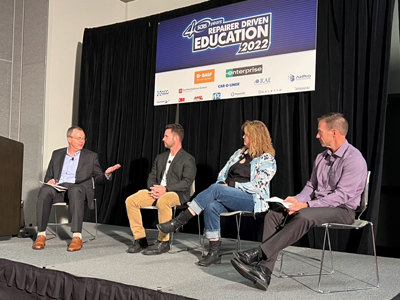As technology increases in new vehicles, so too does the risk of liability for collision repairers, but steps can be taken to mitigate it.
That was the focal point of the Society of Collision Repair Specialists’ Repairer Driven Education session, “Protecting Your Business Against Liability Exposure from Evolving Technology,” held Nov. 1 during the 2022 SEMA Show.
The panel featured David Willett, co-founder and chief underwriting officer for SPARK Underwriters; Shaughn Kennedy, co-founder and senior underwriter for SPARK; Tracy Lewis, owner of Richie’s Collision Center in Mississippi and president of the Gulf States Collision Association; and Jason Mundy, owner of Mundy’s Collision Center near Atlanta, GA.
When Mundy and Lewis were asked separately about their top concerns as a body shop owner, Kennedy said, there was a lot of overlap.
ADAS and Personal Identifying Information
One of their shared concerns was possibly being liable for damages caused by a sublet vendor performing recalibration services on a car’s ADAS features---either because the work was not done properly, causing an accident, or a customer’s personal identifying information was extracted from the infotainment center.
“You always have to worry about did they do it right, and how do I know,” Kennedy said.
Mundy said the owner of a shop in Illinois told him about a 2022 Toyota Camry he repaired. He sent it a local Toyota dealership for recalibration, and then delivered it to the customer.
Not long after that, the customer called the shop owner and said she had just side-swiped another car on the highway when her side mirror’s blind spot indicator failed to come on as she was trying to merge.
Mundy said when the customer brought the car back to the shop, a scan with an aftermarket tool showed the car had not been calibrated or programmed.
When contacted, the dealership wrote a $17,000 check to the shop to cover the second round of repairs.
But, Mundy said, the shop owner said he should’ve driven the car himself before delivering it to the customer the first time.
“We put a lot of trust in people we send cars out to,” Kennedy said. “From an insurer standpoint: qualify vendors to mitigate your risk, make sure they have liability insurance. If they don’t, it’s gonna go on your insurance. Your liability insurance is the primary when you sublet work out.”
Willett said it is becoming important for repairers to track vendors’ insurance.
“It can run out, or their policy can change, be lowered or altered,” he said.
Lewis said it is worth considering doing ADAS recalibrations in house, which can both protect a shop from liability issues if a third party does not perform them correctly and save money.
Mundy pointed out collision repairers need to at least know recalibration procedures, even if they’re not performing them themselves, so they can ask third parties if they did it correctly.
Kennedy said it is important for shops to delete customers’ information from total loss vehicles.
“Total losses used to mean just getting remotes and paperwork out of the car,” Lewis said. “Now, when you plug your phone in, it downloads information and stores it---even in rental cars.”
Lewis said repairers can charge an hour of labor to delete data, following the vehicle’s particular OEM procedure.
OEM Procedures
The panel recommended shops research every repair, as OEM procedures can change so frequently---even within the same model year.
Mundy suggested time-stamping pre-repair research, in case the procedure changes after the repair is complete.
“I’ve had to examine shops’ work on a lot of claims,” Kennedy said. “ALLDATA can change from five years ago. There’s no way to prove [it was the correct procedure when you performed it] if you don’t document every repair procedure.”










Abby Andrews